Be Intentional with Everything We Do.
On learning how to live a happy life in the Land of the Thunder Dragon (1/3)
This is the first of a three-part personal reflection on my Impact Safari Bhutan experience! Feel free to read Part 2 and Part 3 if so inspired! 💜
Since arriving home four days ago, I have been staring at the blank word document on my laptop for hours every day.
I want to write about my experience in Bhutan. One that was so deeply personal, profound, and transformative. A hint of worry and anxiety lingers within that I may soon forget every significant detail of this trip once I return to Australia. The more I try to cling onto my memory, the blanker the mind becomes. I am completely lost for thoughts and words.
As I once again lock horns with my writer’s blocks (while my body shivers and burns in fever), I suddenly hear in my head the calming, soothing voice of our Buddhist teacher who guided us on this journey. I travel back to the day when the eight of us sat cosily in the minivan after one of field trips. She asked us to ponder three questions:
“What touches you? What surprises you? What piques your curiosity?”
Images, sensations and emotions start to flow through my consciousness – like the Paro Chhu near our hotel – slowly, gently and effortlessly. The Buddha is right. We suffer when we try to grasp at what we think will gratify us and avoid what we dislike. To be free from suffering, as another teacher shared, letting go of judgement, desire and attachment is just the start. Next, we practise “letting come and letting be”. Allow, observe and immerse in whatever emerges. Remember that every moment is perfect as it is.
For me, this trip marks a significant milestone. It is the first time I have done group travel since 1993 (after spending 21 days with my family on a group tour in Europe, eating too many Chinese food, and having less than an hour to explore The Louvre! While I was grateful for the experience, I swore I would only travel on my own terms in my adulthood.) It took much faith and courage to step out of my comfort zone and trust the teams from the Small Giants Academy and Gross National Happiness (GNH) Centre Bhutan to take me on an epic journey.
Over the course of ten days, my soul was touched, my body and spirit were surprised, and my mind was piqued with curiosity. Ten days is a relatively short span of time. Even the monarch butterfly takes 28 to 32 days to metamorphose. Yet I feel like I had lived a lifetime – that I died, transitioned and reborn – in this small mystical kingdom in the Himalayas.
This trip was full of auspicious synchronicities, cathartic releases, and illuminating discoveries.
Day 1: Landing
Our first day in Bhutan coincided with Zhabdrung Kuchoe, the national holiday in remembrance of the death anniversary of Zhabdrung Ngawang Namgyala, who unified Bhutan during the 1600’s. En route from Paro to Thimphu, we stopped at Tachog Lhakhang (‘Temple of the Hill of the Excellent Horse’). I was mesmerised by the sight of so many Bhutanese people, all dressed in colourful and beautifully weaved Gho and Kira, coming together with families and friends to commemorate their founding father at the temple.
The ground was old, rugged and relatively untouched. Prayer stones, prayer flags, prayer wheels spread randomly along the perimeters. Outside the temple, at least a hundred pairs of shoes scattered across the courtyard under the orange tree. Deep cracks and chipped paint clinged onto the wooden window frames. Oily and smoky stains smeared all over the glass of the butter lamp house. It is unusual to observe such disorderliness and weariness in holy places in the West. Yet I felt this deep, grounding energy gently pulling me toward the heart of this land, like a soft, warm hug from a long-lost friend.
Under the gaze of the Buddha, Guru Rinpoche and other deities inside the centuries old prayer hall, we learned to do prostrations, a physical practice to show respect to Buddhism’s Three Jewels, to purify the mind, speech and body, and to dissolve the ego and humble the pride. As I bowed alongside others, I suddenly remembered how I used to refuse to participate in any Buddhist rituals including prostrations when my father was alive, who was so eagerly wanting to share his knowledge and experience. I took a big, deep breath in and let out a long, quiet sigh, wondering why and what I was resisting back then. My heart ached a little with sadness and guilt passing through between each breath.
The day ended with an opening circle inside the golden prayer hall situated directly under the Great Buddha Dordenma. Together we sat quietly and meditated on our intentions for this trip. Despite our differences, common threads emerged with all desiring to slow down momentarily, take stock of our mere human life, and ponder what a good life would look like for self and communities.
I travelled to Bhutan holding two intentions in my heart:
To honour my late father, who gifted me the knowledge and wisdom of Buddhism.
To remember and return to myself, after losing and letting go of many things in the past two years.
I did not have any expectations for this trip. I trusted that whatever happened would be exactly what I needed in this season of my life. I wrote on a little Post-it note “Let go ~ Let come ~ Let be” and put it in my wallet.
When we start to peel back layers of noise and distractions, we would realise each and every one of us, regardless of age, gender, race, religion or status, aspires for the same thing in life – as Yongey Mingyur Rinpoche said, “The basic concern shared by all beings…is the desire to be happy and to avoid suffering.”
Day 2: Learning
The Buddha taught that the way out of suffering is through the eightfold path, with the right intention (sometimes translated as right view or right resolve) being the second step: cultivating and grounding our values, thoughts and actions in compassion, goodwill and non-attachment toward all beings.
As a Buddhist country, Bhutan has always ensured their core values of compassion, loving-kindness and non-harming are embedded in the governance system, and that the wellbeing of their people are prioritised. Their right intention could be traced back to as early as 1629 when Bhutan’s ancient legal code stated that, “if the government cannot create happiness for its people, then there is no purpose for government to exist.”
Nowadays Bhutan expresses their right intention through the Gross National Happiness (GNH) index, a “multidimensional development approach seeking to achieve a harmonious balance between material well-being and the spiritual, emotional and cultural needs of society”. The Bhutanese Constitution commits the government to protecting and strengthening the inclusion and continuity of GNH values throughout the country, emphasising “the State shall strive to promote those conditions that will enable the pursuit of Gross National Happiness.”
The GNH was originally conceptualised by His Majesty Jigme Singye Wangchuck, the Fourth King of Bhutan, in the early 1970s (when he was still a teenager!) He declared the GNH as “more important than Gross Domestic product (GDP).”
The GNH consists of four pillars, nine domains and 33 indicators, measuring beyond the market value of all goods and services produced and rendered by the country.
The Bhutanese Government conducts the nationwide GNH survey every few years, not only to assess and track progress of the happiness and wellbeing of their people, and also to use data trends to inform policies that support districts and people that may have fallen below the pre-determined sufficiency threshold.
Learning the history of Bhutan and the GNH index has made me fall in love with this small land-locked country even more. Is Bhutan perfect? No. Is the GNH index perfect? No. But I admire their aspiration, courage and strong will to choose and chart a different path. By staying true to their vision and values, Bhutan has achieved remarking things, just to name a few:
Being the world's first carbon-negative country with forests covering over 70% of the land
Banning mountaineering out of respect for local spiritual beliefs, preserving many sacred mountains and native forests
Free healthcare and education for all citizens
Teachers and healthcare workers are the highest paid civil servants
Inclusion of meditation and GNH values in school curriculums to cultivate inner leadership and emotional intelligence from a young age
All while the Bhutanese Government continues to work toward reducing poverty and improving life expectancy and wellbeing across the country.
We can certainly learn from Bhutan and apply the GNH index (fully or partially) in our own life, community and business – to envision a good life and a good society beyond the metric of market values, efficiency and productivity; and to define our own version of success that supports and sustains the happiness and flourishing of self, others and the environment.
Day 3: Overcoming
A shift of pace and direction in the program got us hiking 12 kilometres and 3000 metres above sea level across the Thimphu Valley to the Dodeydrak Monastery, a learning institute and home to over 150 Buddhist monks.
As someone who had never hiked before, this was the most difficult and also the most rewarding thing I had done to date. The physical side of the hike was expectedly tough, but my internal monologue at the beginning of the hike made the experience much worse than it had to be:
“This hike is hard. And it’s so hot!”
“Don’t fall! Don’t step on the cow dung!”
“I can’t breathe. My legs and back hurt.”
“Oh my god. I am so slow and unfit.”
The mind behaved like an intimidating bully, judging my every step and stride, criticising my endurance (or lack thereof), and laughing at my physical discomfort.
As we were approaching the second sheltered canopy to rest, I looked up and saw our teacher hiking a few metres in front of me. Her stride looked so elegant and relaxed, like she was breezing through the hike. I was mesmerised and inspired.
At the canopy, I shared my observation with her and asked for advice. To my surprise, she said, “I find it uncomfortable to hike in this heat, too. I just focus on my intention. Take one step and one breath at a time. Stay with it. Feel it. Allow it. Don’t try to change anything.” She was right. There was nothing wrong with the hike, the weather, or my body. It was my mind (and my ego) playing tricks and telling me otherwise.
Before continuing the rest of the hike, I set two intentions: one, to connect with my body, and two, to enjoy the view. By giving the mind something tangible to focus on, my experience started to shift. I became more present and neutral. I cheered on my body to keep going. I began to notice little details of nature that made me smile. I thanked the trees and the breeze for keeping me cool. I quietly chanted a mantra every time I saw prayer flags or prayer stones. The hike gradually became less painful and more enjoyable.
When I finally reached the monastery, I noticed this indescribable, euphoric feeling surging through my whole body, followed by a sense of profound, pure inner joy and happiness. I had never felt anything like this before – and the simple act of finishing a hike somehow made many of my past achievements seem pale and insignificant in comparison. Maybe I was getting closer to what Deepak Chopra said, “When mind, body and spirit are in harmony, happiness is the natural result.”
"Nothing could be more striking than the pristine, haunting beauty of the landscape of Bhutan, or the atmosphere of peace and sacredness, which pervades the land from end to end. Bhutan is a place blessed with an almost magical power to transform the mind, whenever I am there I feel as if transported into a pure realm."
~ His Eminence Sogyal Rinpoche, Buddhist spiritual master, philosopher and writer
Thank you for reading Part 1 of the three-part personal reflection on my Bhutan trip Feel free to read Part 2 and Part 3 if so inspired.

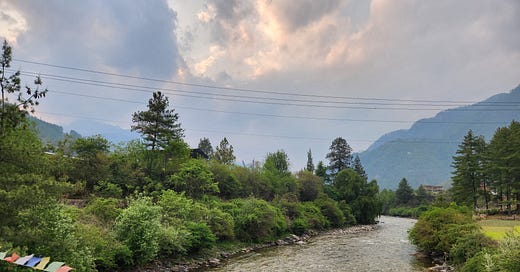



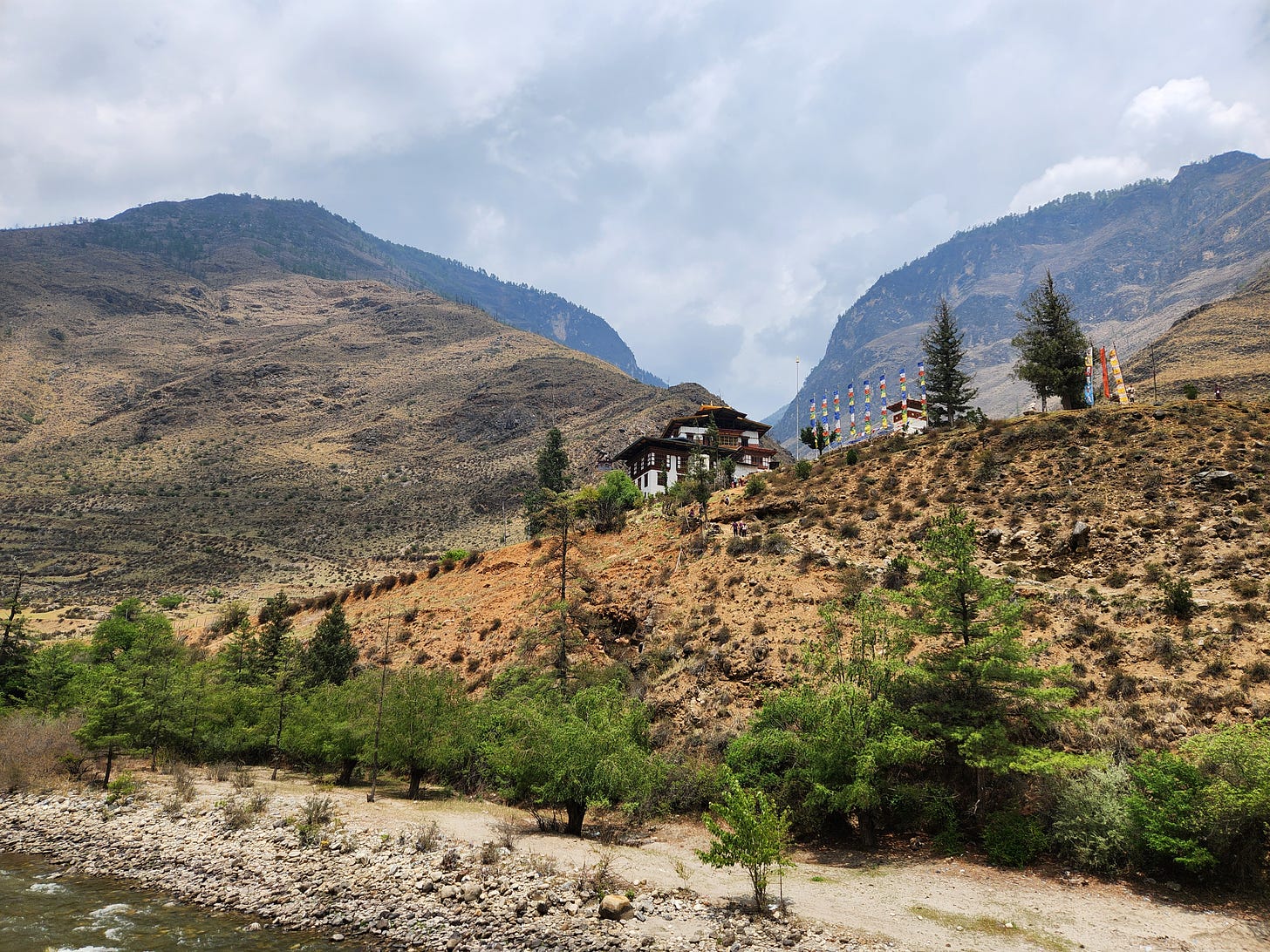

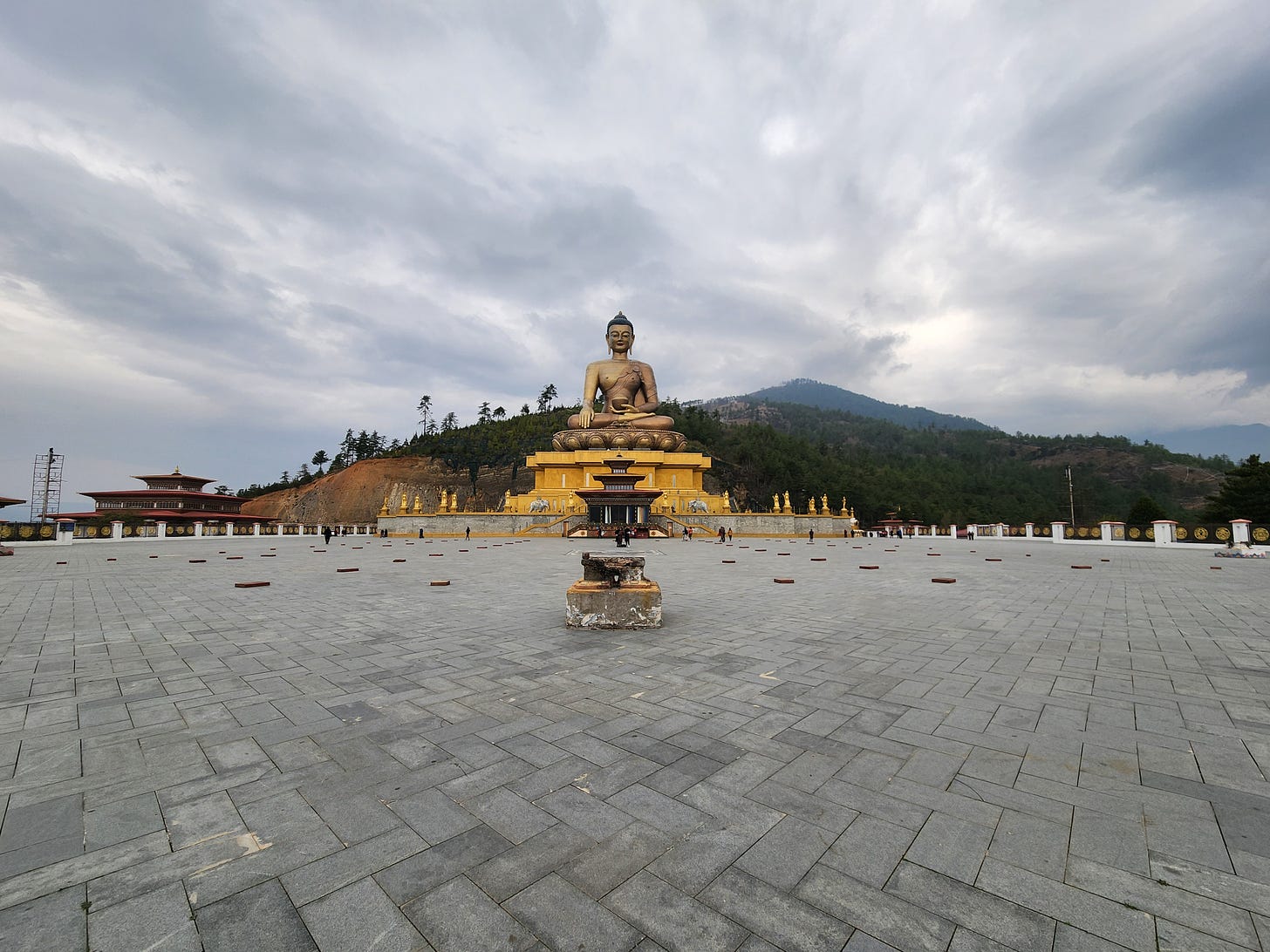
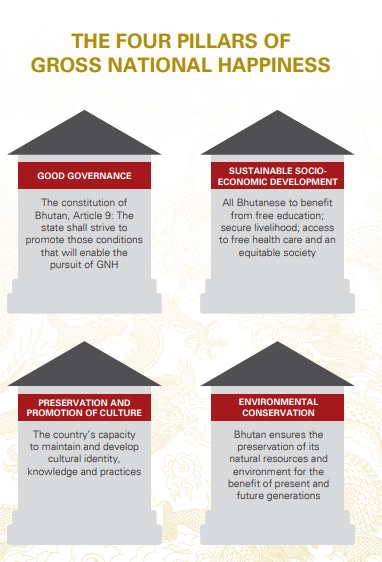

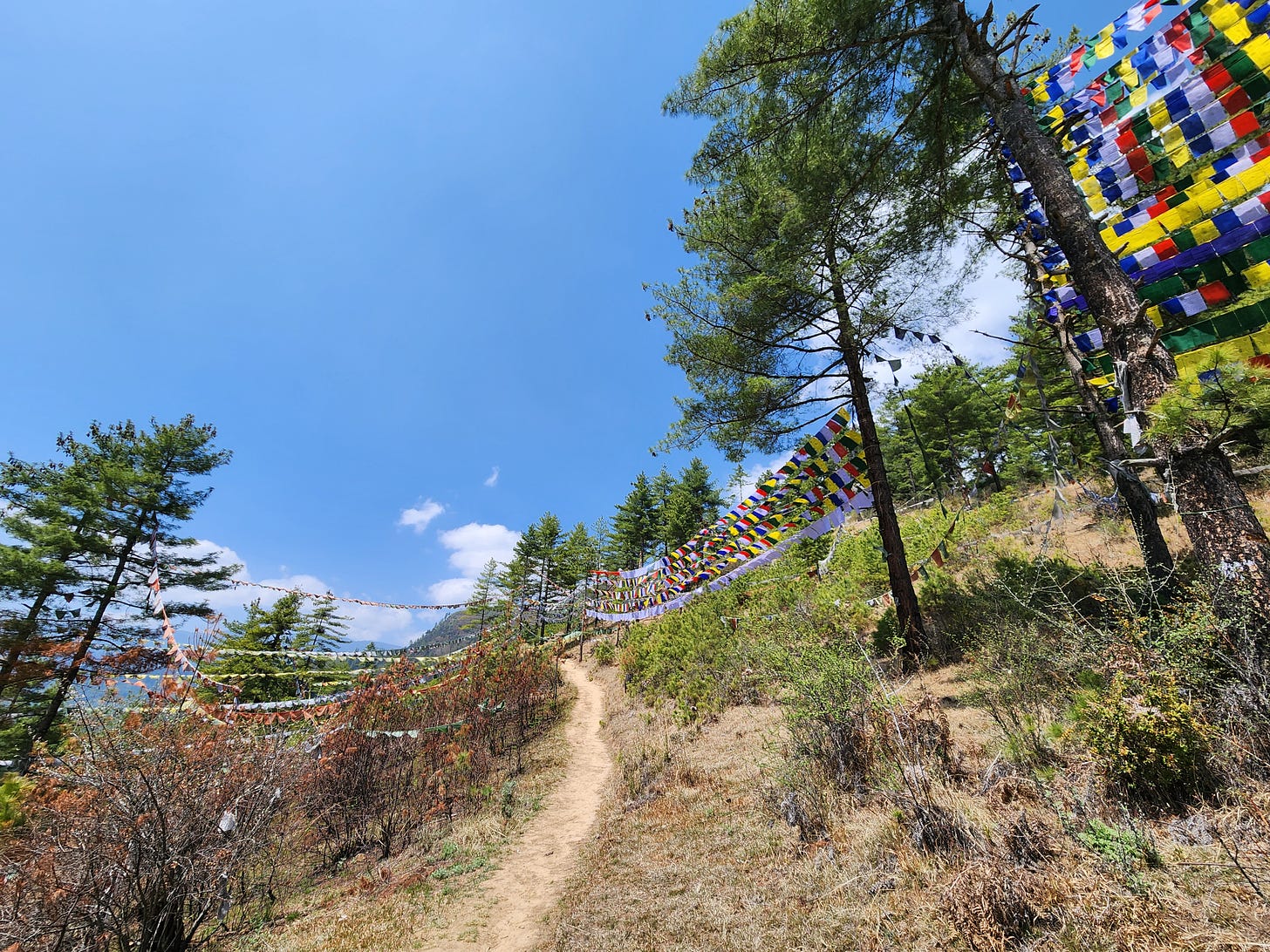
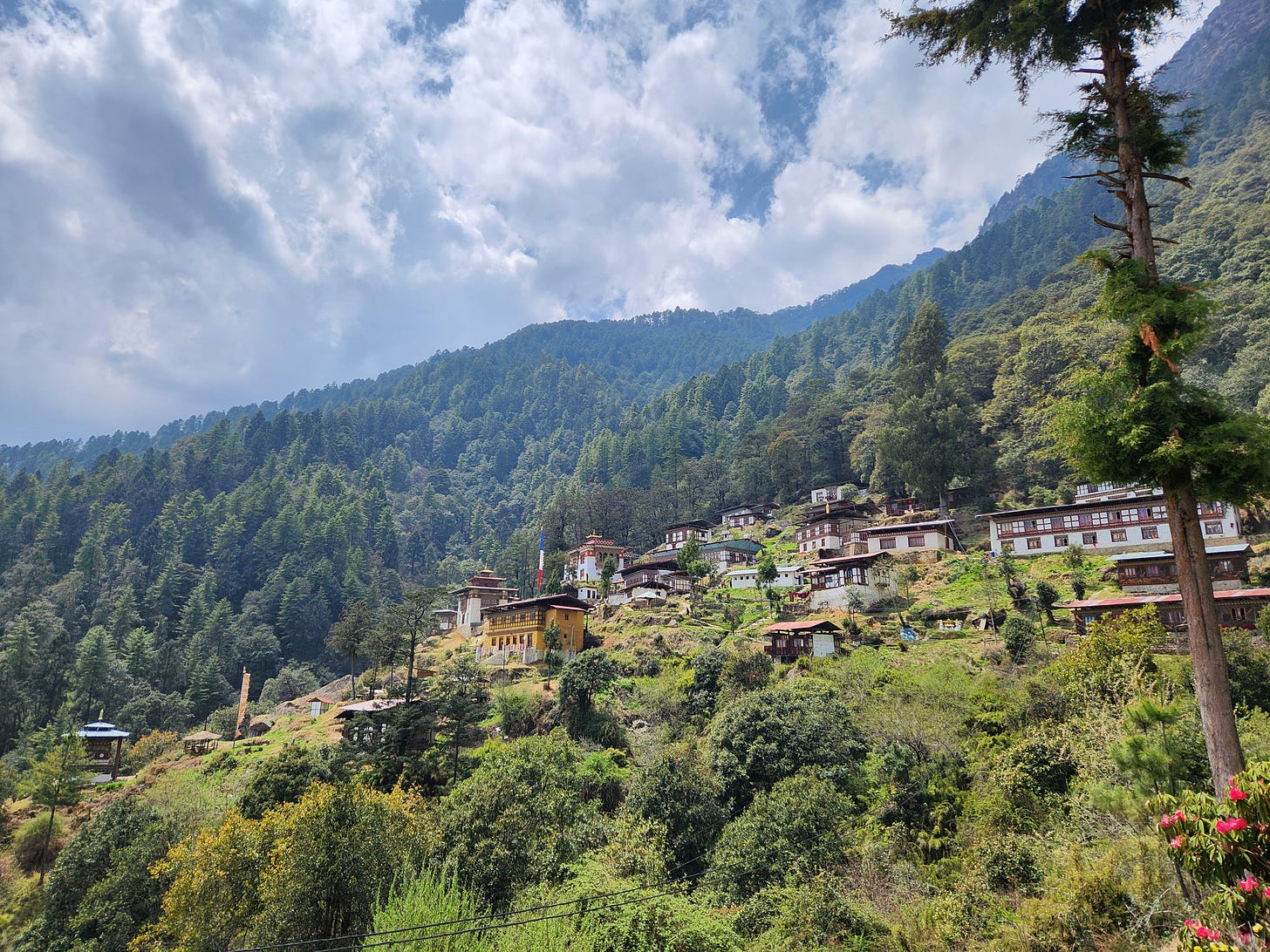
The photos are so soothing Bonnie.
I was reminded of a quote from Nick Cave when I read this
"To remember and return to myself, after losing and letting go of many things in the past two years."
He said in an interview with Amanda Petrusich for The New Yorker,
"Grief is extraordinary in its capacity to completely alter us on an almost atomic level. Suddenly, we inhabit a different body. Our relationship with everything seems to change. It’s as if we’re simply a different person. I meant that quite literally. I changed from one person to another person."
- Nick Cave
Perhaps after your trip your atoms feel different?
So much love for you & your journey beautiful B 💚💚💚💚
Deep thanks, as always xxos